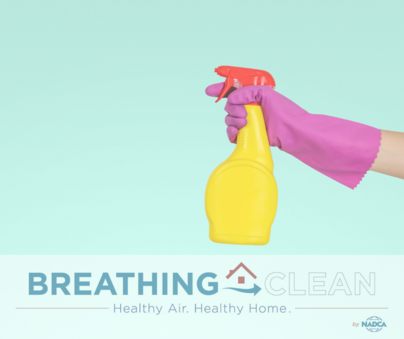How Everyday Household Items Affect Your Indoor Air Quality
As a homeowner, you should be aware of any items that could have a negative impact on your indoor air quality and how they might be harmful. This knowledge can help you make educated decisions when selecting the products you use in your home. The result? A cleaner and healthier indoor environment for you and your family.
Common, everyday items that people use to keep their homes feeling fresh and clean but could be harming the air quality include:
- Scented candles
- Air fresheners
- Cleaning products
- Open paint cans
- Upholstered furniture
All of these products, among many others, produce volatile organic compounds (VOCs) which contribute to poor indoor air quality and can be harmful to your health. 
What are VOCs?
According to the EPA, VOCs are emitted as gases from certain solids or liquids. Often containing fluorine, chlorine, bromine, benzene, formaldehyde, and toluene, these organic compounds easily vaporize and can be dangerous to the humans that come in contact with them.
How VOCs Can Affect Your Health
Candles and air fresheners may leave a warm and welcoming smell in your home, but the long-lasting health issues they can cause are not so pleasant. For example, when an air freshener is sprayed it emits VOCs into the air that could cause symptoms such as:
- Eye irritation
- Nose and throat discomfort
- Headache
- Allergic skin reaction
- Nausea
- Fatigue
- Dizziness
The EPA states that extended exposure can cause more serious side effects such as asthma, liver and kidney damage, and central nervous system damage. So how do we lessen our exposure to these harmful contaminants?
How to Combat VOCs
There are many things you can do to combat those evil VOCs, reduce your exposure, and keep the health issues at bay:
- Improve the ventilation in your home.
- Keep products containing VOCs in outdoor storage.
- Seal surfaces that contain these dangerous compounds.
- Be mindful of the ingredients in the products you use.
How Air Duct Cleaning Can Help
You can do your due diligence and improve your home’s air by avoiding certain household items, but sometimes that isn’t always enough.
The air in your home is typically pulled into the HVAC system and recirculated 5 to 7 times per day. Over time, this recirculation can cause a build-up of contaminants in the ductwork. By having your air ducts properly cleaned, you can improve the ventilation throughout your home and lessen the number of pollutants that could be hiding in your ductwork and in the air you breathe.
How to Get Started
Be sure that any company you hire to perform your air duct cleaning is a member of the National Air Duct Cleaners Association (NADCA)—which means that they pledge to the NADCA Code of Conduct and clean according to ACR, The NADCA Standard. To find a NADCA member in your area, visit the Find a Professional Directory and schedule a cleaning today!
